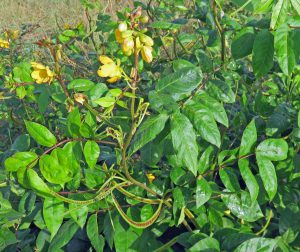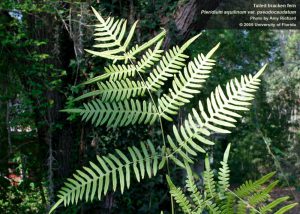With cold weather comes the potential for livestock losses. Once our perennial grasses become dormant and unproductive, it becomes more likely for weed poisonings to occur. As a livestock owner you must stay vigilant to prevent such problems. The prevention habits you use really need to happen all year long, and not just when winter arrives.
Provide Ample Forage
Your best “defense” is a good “offense”. Generally, livestock will not eat poisonous weeds unless they must (this is not a 100% guarantee.) The principle goes like this: if they are supplied with plenty of good quality forage, they typically will consume what they “should.” By providing them with more forage than they need, they can choose correctly. For winter, provide plenty of good quality hay or plant winter annual grasses like ryegrass or oats. If you would like to plant winter annuals next year, here is a guide Winter Annuals
Chronic vs. Acute Poisoning
When livestock ingest a quantity of poisonous compounds that is enough to kill them it is called “acute poisoning.” Another, more prevalent type is called “chronic poisoning.” Chronic poisoning, in some ways, can be more detrimental. In these cases, livestock eat some of the poisonous compounds, but it doesn’t kill them. They can do this for extended amounts of time, taxing their liver and immune system. This state of stress can affect overall health of the animal and they will not reach or maintain their full potential. In some cases, that long-term stress could lead to the death of the animal, but poisoning would not be the primary cause of death. It would just be the underlying condition that caused the animal to be susceptible to a disease, extreme weather, etc. Livestock are better able to defend themselves from health challenges when they are stress-free.
Scout for Poisonous Weeds
In Florida, we can grow a whole lot of weeds. Scouting for the poisonous ones should be a regular routine, particularly if forage is in short supply. There are many resources available for weed identification. Your Livestock Extension Agent at your County Extension Office can help. Weed management can be difficult but is necessary. Here is a guide: Weed Management
Here are a just a few to watch for, particularly in winter:

Coffee Senna seems to become more attractive to cattle when it has been through a frost. This is a case where having plenty of forage is NOT going to help. The poisoning causes the nervous system to shut down on otherwise healthy animals. I have heard cattlemen say they have done a necropsy on dead cattle and have found the rumen to be full of seed the pods. It is best to eradicate this weed from pastures well before the cold season. Article on Coffee Senna

Bracken fern can be found in wooded areas. During the winter, when forage is less available, cattle will graze in the woods more often than in the summer. This can be a great opportunity for expanding grazing and helps to keep brush (and potential wildfire hazards) to a minimum. But, if forage is too short, cattle can graze the wrong things. One such plant is the bracken fern which can be prevalent in some areas. Scout any new grazing areas in woods for bracken fern. Article on Bracken Fern

Coral Ardisia, which is an ornamental, has spread to our wooded areas as well. It comes in by seed, either carried by wildlife or by streams, and settles in our low areas. Be on the lookout for the plant and remove as soon as possible. It will come back from seeds that are dropped on the ground, so it will take repeated removal to fully eradicate this weed. It is especially troublesome because its waxy leaves make it very resistant to herbicides. Additionally, it grows in hard to reach areas where herbicide equipment cannot reach. Article on Coral Ardisia
If you would like more information on weed management or would like a weed identified, contact Laura Bennett at laurahbennett@ufl.edu
 0
0
